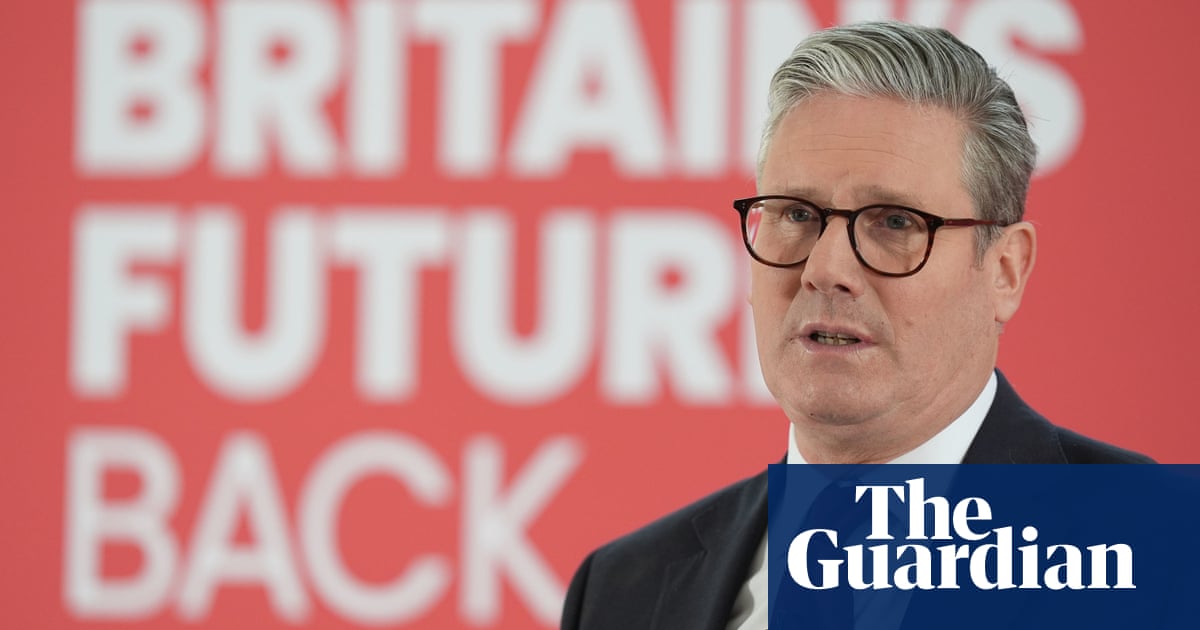Keir Starmer goes into the general election widely expected to emerge as prime minister, despite being roughly as personally popular as Ed Miliband was at the time of the 2015 election.
Headline polls suggest Labour will win a convincing majority in July, with the party 20 points ahead, potentially enough for a landslide victory.
But underlying data suggests Starmer and his party are no more popular or trusted than they were heading into 2015, when the Conservatives won a majority.
A recent Guardian analysis of data from the polling company Ipsos shows fewer voters think Labour is fit to govern than did in 2014, fewer think it has a good team of leaders and fewer think it understands the UK’s problems.
Ben Page, the chief executive of Ipsos, said: “Starmer’s personal ratings are the lowest Ipsos has ever seen for an opposition leader who is so far ahead in the overall voting intention. It is more disgust at the Tories than delight at what Labour offers that is driving politics.”
Since taking over as party leader in 2020, Starmer has overhauled Labour’s policies, its personnel and transformed its poll rating.
Having initially been elected on a platform of continuing the legacy of his predecessor Jeremy Corbyn, Starmer soon began overturning much of the party’s 2019 manifesto.
The process accelerated after the Hartlepool byelection in 2021, which Labour lost heavily to the Tories, only the second time a governing party had increased its share of the vote in a byelection since 1982.
Since the early days of his leadership, Starmer has dropped pledges to abolish university tuition fees, increase income tax for the top 5% of earners and bring in public ownership of rail, mail, water and energy.
He has also made, and then abandoned, a promise to spend £28bn a year in green investment, and watered down a flagship policy to improve workers’ rights.
Perhaps most significantly, he has gone from promising to protect free movement as Britain left the EU to insisting that a Labour government would not even countenance rejoining the customs union.
Starmer’s approach has mirrored that of Tony Blair in 1996 and 1997, when the then Labour leader was likened to “a man carrying a priceless Ming vase across a highly polished floor”.
It has also paid off. Labour is now 44% in the polls, compared with 29% at the previous election, and has made most impact with the kinds of leave voters in marginal constituencies who are likely to decide the election.
The cautious Ming vase strategy also has downsides, however. One consequence is that it has alienated some traditional Labour supporters, with the party now concerned about losing the urban seats of Bristol Central and Sheffield Hallam.
Some believe Starmer’s determination to stick closely to the government’s position on Gaza could also cost it victory in marginal seats with a high Muslim population.
More significantly however, some in Labour worry it has made the party more vulnerable to attack during a general election campaign.
“The problem is, if you don’t have anything you’re willing to defend at all costs, you get buffeted about by every opposition attack,” said one Labour source. “It allows the other party to set the agenda the whole time.”
Starmer’s aides brush aside any such concerns. Starmer’s chief election strategist, Morgan McSweeney, believes the bigger risk lies in setting out ambitious post-election plans that then blow up during the campaign.
In a briefing to the shadow cabinet at the start of the year, McSweeney presented Labour frontbenchers with a series of slides showing that in eight recent elections around the world, the leading party going into the campaign collapsed in the final few weeks.
He pointed to the 2017 general election, which Theresa May called in order to secure a majority, but which ended up costing her seats after a botched promise to overhaul the social care system.
If Starmer does win, he will become the fourth Labour leader to take the party into government since the second world war, and only the second in the past 50 years.
Unlike Blair, however, he will then inherit an economy that has only just emerged from recession, stretched government finances and crumbling public services.
One Labour official said: “The good thing about the Ming vase strategy is that at least if we win, expectations will be low.”

